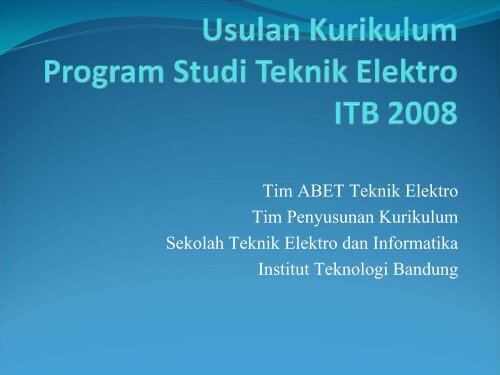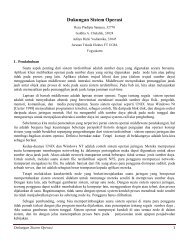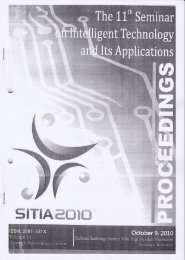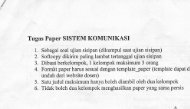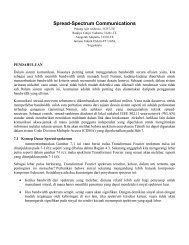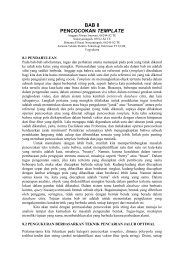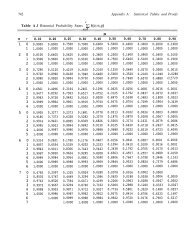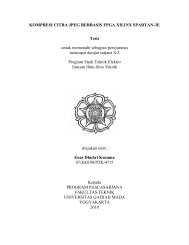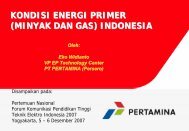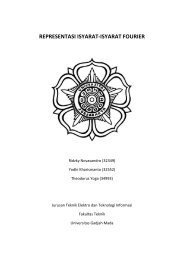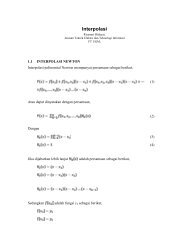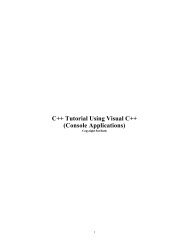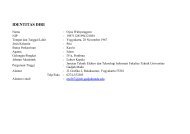Usulan Kurikulum Program Studi Teknik Elektro ITB 2008
Usulan Kurikulum Program Studi Teknik Elektro ITB 2008
Usulan Kurikulum Program Studi Teknik Elektro ITB 2008
- No tags were found...
You also want an ePaper? Increase the reach of your titles
YUMPU automatically turns print PDFs into web optimized ePapers that Google loves.
Substantial Equivalency• Means the program is comparable in educationaloutcomes, but may differ in format or method of delivery.• Substantial equivalency is not accreditation.• In August 2007, ABET launched International ABETAccreditation
ABET Accreditation• ABET accredits Academic <strong>Program</strong> (Study <strong>Program</strong>)• It is based on outcomes assessment.• Preparation for ABET accreditation is continuous process.• Accreditation based on 8 Criteria• The most difficult one : <strong>Program</strong> Outcomes andAssessment.
ABET Accreditation (2)• All the faculty members of the program have theresponsibility for interpretation of results of outcomesassessment.• ABET evaluation based on the program self-studyreport & campus visit.
ABET Structure
Why ABET Accreditation?• Accreditation helps many people make importantdecisions about education, including:• students choosing an educational program;• parents seeking assurance of a quality education;• institutions seeking to improve the education provided bytheir programs;• employers recruiting well-prepared graduates;
Why ABET Accreditation?• Internationalisation of the program• ABET accreditation is also a consideration for admissionto many graduate programs.• Higher Education Long Term Strategy
Continuous ImprovementLoop
<strong>Program</strong> Outcomes Relationship toEducational Objectives and Criterion 3Student should be able to demonstrate• (k) an ability to use the techniques, skills, and modern engineering toolsnecessary for engineering practice• (l) breadth of knowledge over all areas within electrical engineering(electro-magnetics, power, electronics, signals and systems, and computerengineering)• (m) depth of knowledge in at least one area• (n) knowledge of probability and statistics, including applications toelectrical and computer systems• (o) knowledge of mathematics through differential and integral calculus• (p) knowledge of basic sciences, computer science, and engineeringsciences necessary to analyze and design complex electrical and electronicdevices, software, and systems containing hardware and softwarecomponents• (q) knowledge of advanced mathematics, linear algebra, complexvariables, and discrete mathematics.
AssessmentNo. Items Assessed Assessment Tool1 <strong>Program</strong> Outcomes specific tocoursesEnd-of-course self-evaluation byfaculty2 <strong>Program</strong> Outcomes Student survey, Faculty survey3 <strong>Program</strong> Outcomes, <strong>Program</strong>Alumni surveyEducational Objectives4 EC 2007 (a)-(k) Alumni 5-year survey5 Entering and exitingSenior exit surveycompetencies6 (a)-(k) attributes Employer survey, Senior exit survey
<strong>Program</strong> Educational Objectives (1)• Technical Knowledge: Provide a basic knowledge ofelectrical engineering principles along with the requiredsupporting knowledge of mathematics, science,computing, and engineering fundamentals.• Laboratory and Design Skills: Develop the basic skillsneeded to perform and design experimental projects.Develop the ability to formulate problems and projectsand to plan a process for solutions taking advantage ofdiverse technical knowledge and skills.
<strong>Program</strong> Educational Objectives (2)• Communications Skills: Develop the ability to organizeand present information, and to write and speak effectiveIndonesian and English.• Preparation for the Profession: Provide an appreciationfor the broad spectrum of issues arising in professionalpractice, including teamwork, leadership, safety, ethics,service, economics, environmental awareness, andprofessional organizations.
<strong>Program</strong> Educational Objectives (3)• Preparation for Further Study: Provide sufficient breadthand depth for successful subsequent graduate study, postgraduatestudy, or lifelong learning programs.• Preparation for national industrial development: Providesufficient basics to have active roles in developingelectrical engineering and other related industries inIndonesia.
Proposed <strong>Program</strong> Outcomes(1)a. An ability to apply knowledge of mathematics, science,and engineeringb. An ability to design and conduct experiments, as well asto analyze and interpret datac. An ability to design a system, component, or process tomeet desired needs within realistic constraints such aseconomic, environmental, social, political, ethical,health and safety, manufacturability, and sustainabilityd. An ability to function on multi-disciplinary teams
Proposed <strong>Program</strong> Outcomes(2)e. An ability to identify, formulate, and solve engineeringproblemsf. An understanding of professional and ethicalresponsibilityg. An ability to communicate effectivelyh. The broad education necessary to understand the impactof engineering solutions in a global, economic,environmental, and societal context
Proposed <strong>Program</strong> Outcomes(3)i. A recognition of the need for, and an ability to engagein life-long learningj. A knowledge of contemporary issuesk. An ability to use the techniques, skills, and modernengineering tools necessary for engineering practice.l. Background for admission to engineering or otherprofessional graduate programs
Mapping Objective to Outcomesabcd<strong>Program</strong> OutcomesAn ability to apply knowledge of mathematicscience, and engineeringAn ability to design and conduct experimentwell as to analyze and interpret dataAn ability to design a system, component, oprocess to meet desired needs within realisconstraints such as economic, environmentsocial, political, ethical, health and safety,manufacturability, and sustainabilityAn ability to function on multi-disciplinary te1. Technical Knowledge2. Laboratory and Design Skills3. Communications Skills4. Preparation for the Profession5. Preparation for Further Study6. Preparation for national industrial development<strong>Program</strong> Objective1,2,41,2,41,2,5,65,6
Mapping Objective to Outcomesefgh<strong>Program</strong> OutcomesAn ability to identify, formulate, and solvengineering problemsAn understanding of professional and eresponsibilityan ability to communicate effectivelyThe broad education necessary to undeimpact of engineering solutions in a gloeconomic, environmental, and societal<strong>Program</strong> Objectiv1,2,4,65,631,4,5,61. Technical Knowledge2. Laboratory and Design Skills3. Communications Skills4. Preparation for the Profession5. Preparation for Further Study6. Preparation for national industrial development
Mapping Objective to Outcomesijkl<strong>Program</strong> Outcomes<strong>Program</strong> ObjectA recognition of the need for, and anengage in life-long learning1,2,3,4,5A knowledge of contemporary issues 4,5,6An ability to use the techniques, skilmodern engineering tools necessary 1,2,3,4,5,6engineering practice.Background for admission to engineprofessional graduate programs1,2,3,41. Technical Knowledge2. Laboratory and Design Skills3. Communications Skills4. Preparation for the Profession5. Preparation for Further Study6. Preparation for national industrial development
Kerangka <strong>Kurikulum</strong> <strong>ITB</strong>• Ditentukan oleh WRSA – SA• TPB (Wajib STEI) 36 sks• Wajib Prodi >= 44sks• Wajib <strong>ITB</strong> >= 10 sks• Pilihan• Wajib jalur pilihan• Pilihan prodi• Pilihan non-prodi/ minor >= 9 sks
Mata Kuliah TPB
Mata Kuliah Wajib <strong>Teknik</strong><strong>Elektro</strong>
Mata Kuliah Wajib <strong>ITB</strong>• Agama & Etika 2sks• Pilihan Lingkungan 3sks• Pilihan Manajemen 3sks• Pancasila 2sks• Total10sks
Kerangka <strong>Kurikulum</strong> ABET• Ditentukan oleh kriteria ABET• Criterion 3 General Engineering• Criterion 4 Professional Component• Criterion 8 Electrical Engineering <strong>Program</strong> Criteria
Criterion 4 : ProfessionalComponentCurriculum Overview• One year of Mathematics and Basic Sciences• One and one-half Years of Engineering Topics• Engineering Science• Engineering Design• General Education Component, Consistent with<strong>Program</strong> Objectives• Communication skills• Ethics
Criterion 8: <strong>Program</strong> Criteria• A program is an organized educational experience thatconsists of a cohesive set of courses• A definite stem should be obvious in the program• The program should develop the ability to applypertinent knowledge to the practice of the defined areaof the program.• A program must also involve the broadeningeducational objectives expected in modern postsecondaryeducation.
Criterion 8: <strong>Program</strong> Criteria• Specific criteria for undergraduate electrical engineering programdefined by IEEE in cooperation with CSAB• The program must demonstrate that graduates have:• probability and statistics• Mathematics: differential and integral calculus• basic sciences• computer science• engineering sciences necessary to analyze and design complexelectrical and electronic devices, software, and systemscontaining hardware and software components• Advanced mathematics: differential equations, linear algebra,complex variables, and discrete mathematics
<strong>Program</strong> Breadth• <strong>Program</strong> Breadth - Broad programs that will prepare astudent to take advantage of as many different careeropportunities as possible are encouraged. Further,programs which omit instruction in a significantportion of a subject in which a professional in aparticular field may reasonably be expected to havecompetence should not be accredited. (II.B.9)
Struktur <strong>Kurikulum</strong> dengan MinorTechnical Electives(17-18)EngineeringTopics (55 cr)Minor (15)ElectricalEngineeringBreadth (19-20 cr)ElectricalEngineeringCore (35 cr)Mathematics &Basic Science(37 cr)General Education (20 cr)
Struktur <strong>Kurikulum</strong> tanpa minorGeneral Education (20 cr)
Korelasi <strong>Kurikulum</strong> <strong>ITB</strong> -ABET<strong>ITB</strong> ABET w/o minor ABET w/ minorTPB (36) Math and Basic Sciences (22) Math and Basic Sciences (22)General Education (10) General Education (10)EE Core (4) EE Core (4)Wajib Prodi (44) Math and Basic Sciences (12) Math and Basic Sciences (12)EE Core (32) EE Core (32)Wajib <strong>ITB</strong> (10) General Education (10) General Education (10)Pilihan (54) Math and Basic Sciences (3) Math and Basic Sciences (3)Breadth (19) Breadth (20)Technical Electives (23) Technical Electives (18)Non EE Electives (9) Minor (15)
Peta Outcomes (1)
Peta Outcomes (2)
Peta Outcomes (3)
Struktur <strong>Kurikulum</strong> – dengan minor
Struktur <strong>Kurikulum</strong> – tanpa minor
<strong>Usulan</strong> Breadths• EE Material Science (3)• Microprocessor System& Lab (4)• Digital SignalProcessing & Lab (4)• Control System &Lab(4)• Electronics & Lab (4)• Communication &Lab(4)• Computer SystemArchitecture & Lab (4)• Power System & Lab(4)• Biomedical Engineering& Lab(4)
<strong>Usulan</strong> Technical Electives
19 19 38Struktur dengan Minor (1)Tahun PertamaSemester 1 Semester 2No Nomor Nama Matakuliah Kredit No Nomor Nama Matakuliah Kredit1 Kalkulus I 4 1 Kalkulus II 42 Fisika I 4 2 Fisika II 43 Kimia I 3 3 Kimia II 34 Bhs Indonesia 2 4 Bhs Inggris 25 Sport I 1 5 Sport II 16 Art, Science, Tech 2 6 Integrated Science 27 <strong>Program</strong>ming I 2 7 Introduction to Circuit Analysis 218 18 36Tahun KeduaSemester 3 Semester 4No Nomor Nama Matakuliah Kredit No Nomor Nama Matakuliah Kredit1 Engineering Math I 3 1 Engineering Math II 32 Discrete Mathematics 3 2 Algorithm & Data Structure 43 Probability & Statistics 3 3 Electronics I 44 Circuit Analysis 4 4 Electromagnetics 35 Digital System 4 5 Signal & System 36 Religion & Ethics 2 6 Pancasila 27 7
Struktur dengan Minor (2)Tahun KetigaSemester 5 Semester 6No Nomor Nama Matakuliah Kredit No Nomor Nama Matakuliah Kredit1 Breadth 1 4 1 Breadth 4 42 Breadth 2 4 2 Breadth 5 43 Breadth 3 4 3 Technical Elective 1 34 Management Elective 3 4 Technical Elective 2 35 Environment Science Elective 3 5 Technical Elective 3 26 6 Science Elective 37 718 19 37Tahun KeempatSemester 7 Semester 8No Nomor Nama Matakuliah Kredit No Nomor Nama Matakuliah Kredit1 Final Project I & seminar 2 1 Final Project II 42 Internship 2 2Engineering Ethics & SelectedTopics 23 Technical Electives 4 2 3 Minor 3 34 Technical Electives 5 3 4 Minor 4 35 Technical Electives 6 3 5 Minor 5 36 Minor 1 3 67 Minor 2 3 718 15 33
Struktur tanpa Minor (1)Tahun PertamaSemester 1 Semester 2No Nomor Nama Matakuliah Kredit No Nomor Nama Matakuliah Kredit1 Kalkulus I 4 1 Kalkulus II 42 Fisika I 4 2 Fisika II 43 Kimia I 3 3 Kimia II 34 Bhs Indonesia 2 4 Bhs Inggris 25 Sport I 1 5 Sport II 16 Art, Science, Tech 2 6 Integrated Science 27 <strong>Program</strong>ming I 2 7 Introduction to Circuit Analysis 218 18 36Tahun KeduaSemester 3 Semester 4No Nomor Nama Matakuliah Kredit No Nomor Nama Matakuliah Kredit1 Engineering Math I 3 1 Engineering Math II 32 Discrete Mathematics 3 2 Algorithm & Data Structure 43 Probability & Statistics 3 3 Electronics I 44 Circuit Analysis 4 4 Electromagnetics 35 Digital System 4 5 Signal & System 36 Religion & Ethics 2 6 Pancasila 27 719 19 38
Struktur tanpa Minor (2)Tahun KetigaSemester 5 Semester 6No NomorNama Matakuliah Kredit No Nomor Nama Matakuliah Kredit1 Breadth 1 4 1 Breadth 4 42 Breadth 2 4 2 Breadth 5 43 Breadth 3 4 3 Technical Elective 1 34 Management Elective 3 4 Technical Elective 2 25 Environment Science Elective 3 5 Science Elective 36 6 Pilihan Bebas 1 37 718 19 37Tahun KeempatSemester 7 Semester 8No NomorNama Matakuliah Kredit No Nomor Nama Matakuliah Kredit1 Final Project I & seminar 2 1 Final Project II 42 Internship 2 2Engineering Ethics &Selected Topics 23 Technical Elective 3 2 3 Technical Elective 7 34 Technical Elective 4 3 4 Technical Elective 8 35 Technical Elective 5 3 5 Pilihan Bebas 3 36 Technical Elective 6 3 67 Pilihan Bebas 2 3 718 15 33
<strong>Usulan</strong> Minor untuk Prodilain• 1 Introduction to Circuit Analysis (2)• 2 Circuit Analysis & Lab (4)• 3 Signal & System (3)• 4 Digital System & Lab (4)• 5 Electronics I & Lab (4)• 6 Digital Signal Processing & Lab (4)• 7 Microprocessor & Lab (4)• Total 26 credit hours
Kesimpulan• Akreditasi International diperlukan untuk gointernational.• <strong>Kurikulum</strong> Berbasis ABET sangat fleksibel dan selarasdengan ketentuan kurikulum <strong>ITB</strong> <strong>2008</strong>• Perubahan kurikulum diperlukan untuk mengakomodasikemajuan ilmu & teknologi dan untuk menyelaraskantujuan pendidikan
References• http://www.abet.org• http://www.vanth.org/curriculum/curr_abet.asp• Dokumen <strong>Kurikulum</strong> <strong>ITB</strong>


